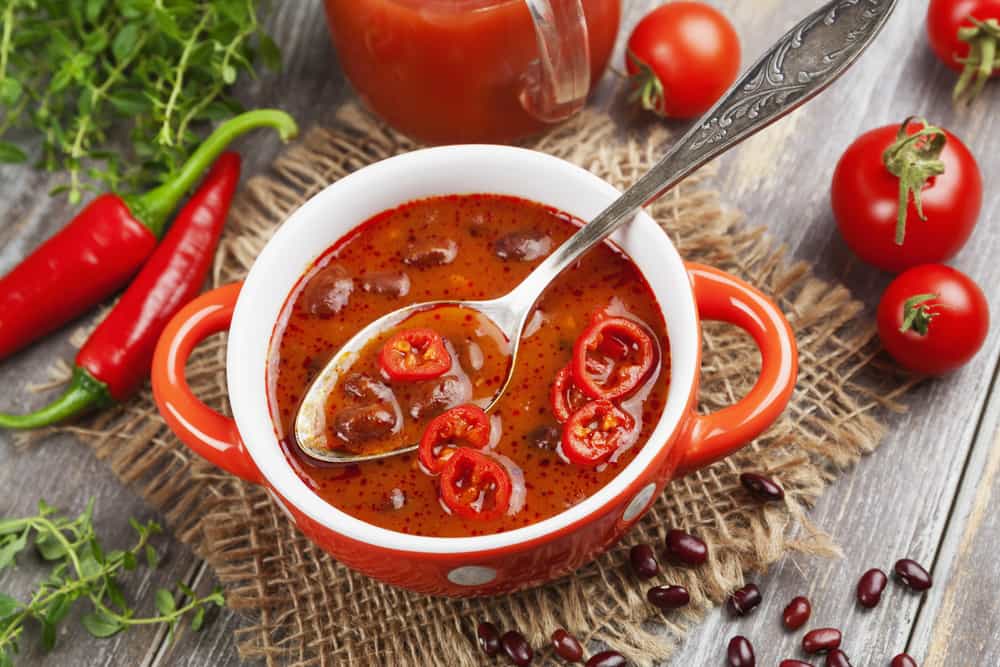Contents:
Medical Video: Spicy Foods Pros and Cons
According to some recent studies, eating spicy foods can provide long life.
As a quick overview of the study, it was concluded that the risk of premature death has decreased by 14 percent if people consume spicy foods 6-7 times a week, compared to those who eat spicy food less than once a week.
But, have you ever wondered why eating spicy food often causes heat, hot flushes, runny noses, and sweating?
The brain is "confused" when we eat spicy food
Spicy foods stimulate receptors on the skin which usually respond to heat. This collection of receptors, namely pain nerve fibers, is technically known as polymodal nociceptors. They respond to extreme temperatures and intense mechanical stimulation, such as pinching and scratching sharp objects; but, they also respond to certain chemical influences. The central nervous system can be confused or deceived when these pain fibers are stimulated by chemicals, such as capsaicin which is commonly found in chili, which triggers an ambiguous nerve response.
So, how does the brain decide whether the mouth is pinched, scratched, burned, or exposed to chemicals? Scientists are not sure how this process works, but they suspect the brain makes judgments based on the type and variety of stimuli received. Stimulus to the nociceptors themselves may indicate extreme and dangerous temperatures. But, capsaicin also stimulates nerves that respond only to mild temperature increases - which give a slight feeling of warmth or heat during "pain". So, capsaicin sends two messages to the brain: ‘I am an intense stimulus,’ also at once ‘I am warm.’ Simultaneously, this stimulation determines a burning sensation, not pinching or scratching.
The central nervous system reacts to any signal sent by the sensory system about what is happening. Therefore, the pattern of activity from pain and warm nerve fibers triggers both physical sensations and reactions from heat, including dilation of blood vessels, sweating, crying, and reddened skin.
The reason is that your body views capsaicin as a foreign substance that needs to be rinsed immediately. This causes the body's mucous glands to work extra hard to repair "damage". The result is a runny nose and runny mouth, followed by an increase in saliva in the mouth.
Also, after heat sensitive pain receptors are activated, your brain believes that your body is too hot and will try hard to reverse this condition. Finally, the body will trigger one of the best defenses against heat: sweat.
The effect of eating spicy foods is the same as the feeling of heat from scraping
Most people think of "stings" from spicy food as a form of taste - like salty, sweet, sour. In fact, two sensory experiences are actually related but very different. Both "turn on" the tongue nerves in the same way, but the pain system triggered by capsaicin is all over the body, so you can get a hot effect on every centimeter of your body curve.
For comparison: some liniment contains compounds that together can stimulate temperature changes in the skin. Menthol acts in much the same way as capsaicin, but in this case, it stimulates nerve fibers that are tasked with recognizing cold temperatures, not nerve fibers for hot temperatures. This is why products containing menthol have names like 'Hot Icy' - menthol stimulates both heat and pain receptors, sending a truly ambiguous brain signal. This difference explains why there is no confusion for the body to detect which ones are menthol stimulation and where capsaicin stimulation: one of them gives the effect of "hot cold", while the other only gives a hot and hot effect that makes emotions flare up.
The sensations produced by menthol and capsaicin are human physiological anomalies - we clearly do not develop receptors to react to these two compounds. Chemicals deceive pain receptors that actually have the only purpose of recognizing important events and threatening safety, such as skin damage and inflammation. The soft texture around the injury is partly due to the same nerve response to chemicals released on the skin. Humans are unique creatures - we can take advantage of nerve responses that usually give danger signals and turn them into something fun.
Interestingly, even though chili is found in many cuisines around the world, capsaicin is actually a nerve poison and in concentrations that are large enough can cause seizures, heart attacks, and even death.
Does eating too much spicy food in large quantities endanger health?
Spicy food can burn your skin, mouth, stomach and intestines - but calm, this is just hyperbolic. As explained above, capsaicin contained in chili only activates nerve fibers that are responsible for producing pain and increasing body temperature, not actually burning your intestinal wall.
How severe the "burn" you feel will depend on your sensitivity to spicy food and how much chili you touch or consume. In some cases, spicy foods can affect or worsen a medical condition, which only increases the intensity of the symptoms but not as a risk factor for the disease.
If you have a gastric ulcer, irritable bowel syndrome (IBS), or other digestive disorders, eating spicy foods can cause so many painful burning sensations that might make you cry. If you have GERD, spicy foods can trigger heartburn (stomach acid rises which causes the throat to feel hot). If you have an intestinal disorder, such as irritable bowel syndrome or Crohn's disease, the sensation of "burning" may not start until food reaches your intestine and enters your intestinal tract.
Some spices, such as mustard and radish, if consumed in large quantities can really damage the tissue, quoted from the SF Gate.
READ ALSO:
- 5 Reasons Why Spicy Food is Good for Health
- Foods that are Good for People with Ulcer
- Revealing the Health Benefits and Risks of Eating Foods












